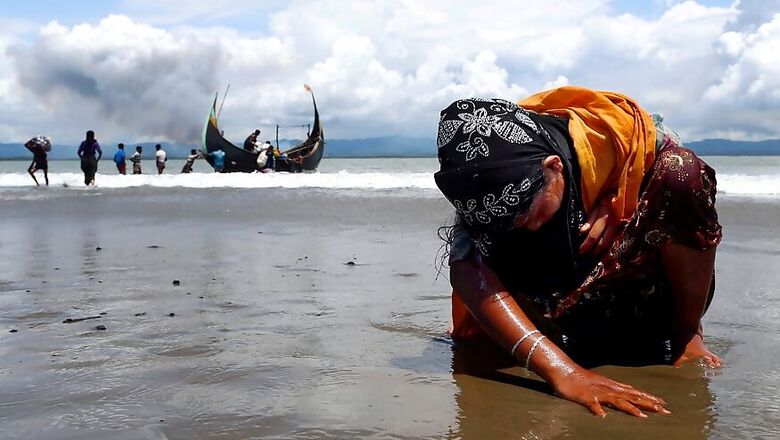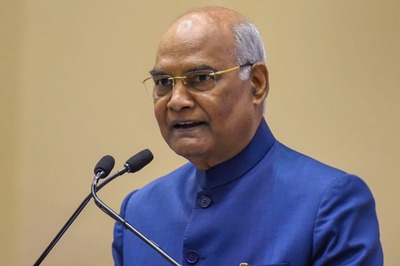
views
New Delhi: At a time when the United Nations came down heavily on the Myanmar government for the Rohingya crisis, calling it “a textbook example of ethnic cleansing”, Ibrahim Dobashi, member of the Board of Trustee of European Rohingya Council (ERC), says this is “the last stage of slow-burning genocide that the Myanmar army has been doing since early 1960s”.
At least 1,64,000 Rohingya Muslims have entered Bangladesh, escaping from violence in the western state of Rakhine. News18’s Debayan Roy caught up with Dobashi on the biggest ethnic crisis of recent times.
Excerpts from the interview:
Q: How would you describe the current Rohingya crisis?
A: The Rohingya crisis is an international emergency. It is one of the biggest examples of atrocities committed by the Myanmar army against the Rohingya people. It is last stage of slow-burning genocide this army has been indulging in since early 1960s.
Q: Bangladesh is currently planning to deport all Rohingyas to Thenga Chhar Island. Is it another simmering crisis?
A: We have also heard of this. Experts say this island is not suitable for human habitation. We believe it is also inhumane to do so. If the Bangladesh government implements this plan, there would be another humanitarian crisis.
Q: Who are the Rohingyas? Is there any way they can claim citizenship in Myanmar?
A: Rohingyas are culturally and historically, a distinct ethnic group living in the western part of Myanmar. They have been there for generations. The Rohingyas were officially recognized as one of the ethnic communities and as citizens of Myanmar by four successive governments since its independence from the British rule in 1948. The 1982 Citizenship Law removed ethnic and citizenship rights of the Rohingyas. If the Myanmar authority reinstates the rights that this community has been enjoying, the Rohingyas can become legitimate citizens of Myanmar. The only obstacle for the citizenship rights is Myanmar's discriminatory policies.
Q: Are there any geostrategic considerations that one must note to while deliberating on the issue?
A: Yes. China and India play a great role in the Rohingya crisis. Strategically and commercially, the Rakhine State plays a huge role. Powerful countries like China, India and the West are pursuing their strategic and commercial interests at the expense of lives of nearly a million Rohingya people.
Q: Why is the state against Rohingya Muslims? Is it just because of the religion?
A: There are many reasons why the state is against Rohingya, and religion has a big role to play in it. Rohingyas are the only largest culturally and linguistically distinct Muslim community in Myanmar, with historical claim to the region, which has a border with the Muslim-majority nation of Bangladesh. The generals perceived the Rohingyas as a natural security threat to the country. Therefore, they have decided to wipe out the Rohingyas from Rakhine State. They have been doing it since the early 1960s. In 1978, they expelled 2,70,000 Rohingyas out of the Rakhine State; 2,50,000, 1,50,000, 1,00,000 in 1991-'92, 2012-2015 and 2016, respectively. This is the largest atrocity crimes to have expelled nearly 2,00,000 Rohingyas.
Q: Is the concept of Buddhist terrorism real?
A: We have been witnessing this in Myanmar. Buddhism like any other religions can be used to justify mass killings and commit mass atrocity crimes.
Q: Has anything changed since the 2012 attacks? Can the international law be held?
A: Nothing has changed in terms of human rights violation of the Rohingya population. The situation is getting worse by the day and the international community has also done nothing to stop the Myanmar army's genocide of Rohingya despite knowing all about it.
Q: What is the most potent solution to the Rohingya crisis?
A: The urgent solution is a UN intervention by sending peacekeeping forces to the ground and create a safe zone for the Rohingya.
Q: Myanmar has been stating that the attacks are because of the rising insurgency groups led by the Rohingya. Is the crackdown to avoid larger conflicts or suppress rebel groups?
A: No. The army is using the insurgency groups as an excuse to inflict mass atrocities on the Rohingyas. Former president Thein Sein publicly told the then United Nations High Commissioner for Refugees (UNHCR) boss to put all Rohingyas in a concentration camp. This is what they have been doing.
Q: Many countries including India are not a part of the 1951 Refugee Convention. Is there a way to prevent the Rohingyas from being deported?
A: Yes. Although India is non-signatory, international pressure can prevent the Rohingyas from being deported by India.
Q: Is there a way to implement the recommendations made by the Kofi Annan commission report?
A: Yes. More pressure from the international community is the only way to implement the recommendation.
Q: How does your organisation plan to treat the Rohingya exodus that is currently underway in Myanmar and the plight of others across the world?
A: Our organization has been lobbying and spreading awareness so the world knows what is going on in Myanmar. This is the only thing we can do right now.




















Comments
0 comment